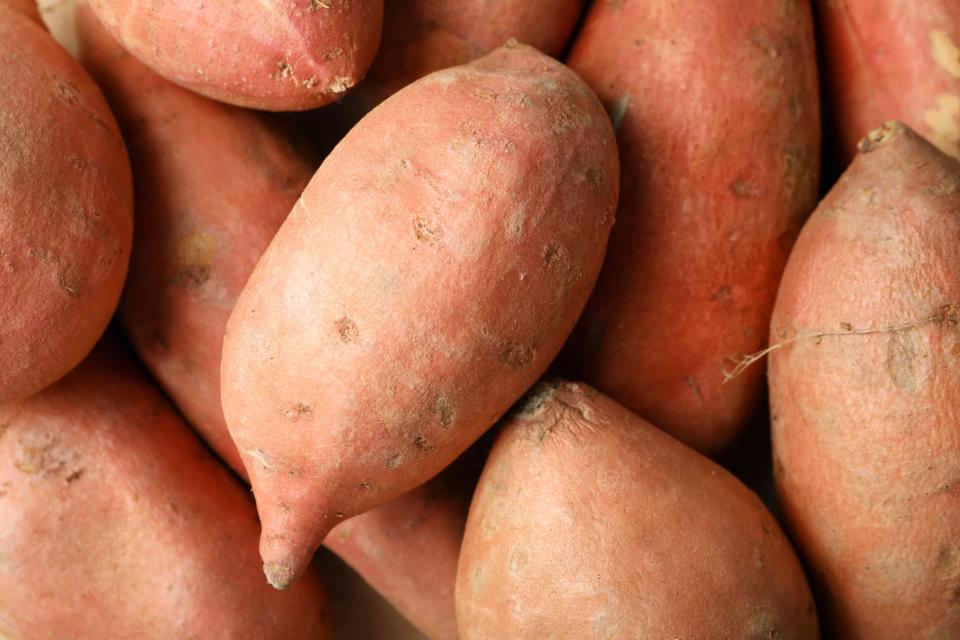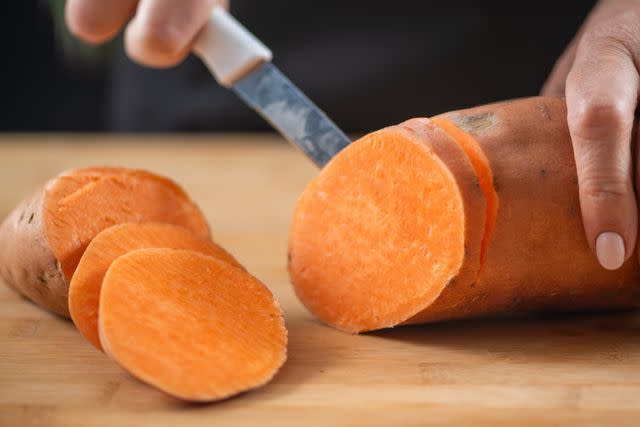The Only Way You Should Store Sweet Potatoes, According to an Expert
These orange root vegetables are surprisingly perishable.

Simply Recipes / Getty Images
When I buy sweet potatoes, I typically put them on a shelf in the pantry. The only problem is that sometimes I forget they’re there. That’s the right spot, says Matt McCort, chief operating officer at Bako Sweet, sweet potato growers out of Bakersfield, California.
“It’s best to store your sweet potatoes in a dark, cool space like the pantry or in a cabinet where they can rest between 55 to 60 degrees Fahrenheit,” he says. “Most importantly, it’s best to store them out of direct sunlight to help them last longer.”
Store sweet potatoes in a breathable container like a basket or mesh bag. “Paper or plastic bags will prevent airflow, which sweet potatoes need in order to avoid mold or sprouting,” McCort says.
If you bought sweet potatoes wrapped in a tray or as a microwavable single potato, it’s OK to store them that way because those package materials are designed to be breathable and keep the produce fresh.
You can keep sweet potatoes out in the kitchen as long as you plan to eat them quickly. “If you want to keep them top of mind, feel free to store them on your kitchen counter,” says McCort. “Just be sure to eat them within a week so they do not start to dehydrate.”

Simply Recipes / Getty Images
What About the Refrigerator?
It’s tempting to store produce in the fridge to make it last longer, but that’s not the best spot for sweet potatoes.
“Colder temperatures and moisture can cause textural and taste issues,” says McCort. “When sweet potatoes are stored in the refrigerator, their starches are impacted by the cold, leading to a harder center when cooked.”
The only time you should store sweet potatoes in the refrigerator is if they’re already cooked. Then you should refrigerate leftovers in an airtight container.
Read More: The Best Way to Cook Sweet Potatoes, According to a Pro Cook
Other Sweet Potato Storage Tips
Sweet potatoes are sensitive to ethylene, a natural gas that encourages ripening. So don’t store sweet potatoes near fruits or vegetables that produce ethylene, such as bananas, tomatoes, and apples.
Like with most fruits and vegetables, you should wait to wash sweet potatoes until you’re ready to prepare them. Then you avoid adding extra moisture. “This will help with shelf life and avoid creating breeding grounds for potential bacteria during storage,” McCort says.
Once you’re ready to get cooking, gently wash sweet potatoes with water and a soft bristle brush to remove any dust, he suggests.
Read More: The 1-Ingredient Upgrade for Better Roasted Sweet Potatoes
Choosing a Good Sweet Potato
Start by making a smart selection at the grocery store or farmers market. “Sweet potatoes are not only healthy, but they are sturdy, which makes them excellent for shelf life,” says McCort, who recommends looking for potatoes that are dry and have firm skin. “This will help ensure that they last two or more weeks at home. Slight blemishes or scars will not impact the taste or quality of your sweet potato.”
If your sweet potato starts to soften, smell sour, or become discolored, that means it has likely spoiled. “You can salvage a sweet potato if there are small spots that are soft or discolored, as long as the rest of the potato is firm and smells fresh. Simply cut away those spots and use the rest.”
Read the original article on Simply Recipes.


